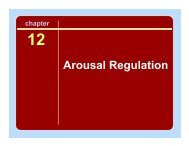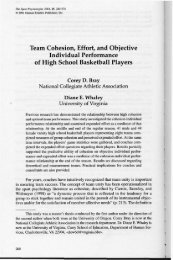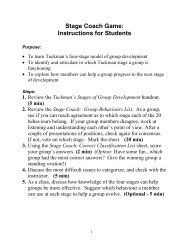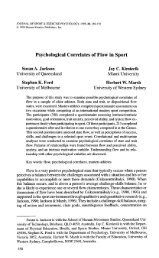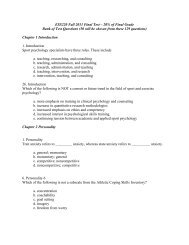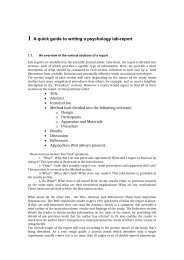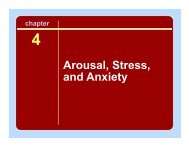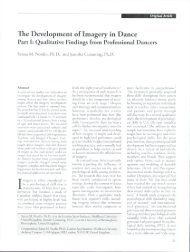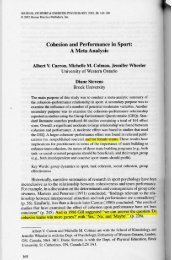Sport and Exercise Psychology Review - Sport Psychology Goes to ...
Sport and Exercise Psychology Review - Sport Psychology Goes to ...
Sport and Exercise Psychology Review - Sport Psychology Goes to ...
You also want an ePaper? Increase the reach of your titles
YUMPU automatically turns print PDFs into web optimized ePapers that Google loves.
Albert V. Carron & Shauna M. Burke<br />
role that context might play in involvement<br />
in physical activity.<br />
Having stated this, however, work from<br />
our labora<strong>to</strong>ry does show that the support of<br />
others does have a major role <strong>to</strong> play. The<br />
meta-analysis carried out by Carron et al.<br />
(1996), <strong>and</strong> introduced in the previous section<br />
on adherence, showed that social<br />
support from family <strong>and</strong> important others is<br />
related <strong>to</strong> cognitions about physical activity,<br />
affect associated with physical activity, <strong>and</strong><br />
adherence behaviour itself.<br />
Insofar as cognitions are concerned, Carron<br />
et al. (1996) reported moderate effect sizes<br />
(ES) between intention <strong>to</strong> be physically<br />
active <strong>and</strong> social support from family (ES =<br />
.49) <strong>and</strong> important others (ES = .44). They<br />
also reported a moderate effect between<br />
social support <strong>and</strong> efficacy for physical activity<br />
(ES = .40).<br />
Insofar as affect is concerned, the relationships<br />
are even stronger. Carron et al.<br />
reported moderate relationships between<br />
affect associated with physical activity <strong>and</strong><br />
social support from family (ES = .59) <strong>and</strong><br />
important others (ES = .63).<br />
Finally, Carron et al. (1996) reported small<br />
<strong>to</strong> moderate relationships between social<br />
support <strong>and</strong> behaviour. For example, support<br />
from family has a small relationship with<br />
adherence (ES = .36) <strong>and</strong> a moderate relationship<br />
with compliance (ES = .69). Also, social<br />
support from important others has a moderate<br />
relationship with adherence (ES = .44).<br />
Pro<strong>to</strong>cols adopted <strong>to</strong> promote<br />
behavioural change<br />
Many human behaviours falling under the<br />
rubric of addictions, compulsions, or<br />
dependencies are socially inappropriate<br />
<strong>and</strong>/or personally destructive. Often, these<br />
behaviours are so ingrained that the individual<br />
comes <strong>to</strong> the conclusion that behavioural<br />
change cannot be achieved without professional<br />
help.<br />
A lack of physical activity certainly cannot<br />
be considered an addiction or compulsion.<br />
Nonetheless, it does share a common<br />
dilemma for health-care professionals –<br />
effecting long-term behavioural change is a<br />
considerable challenge. Thus, it seems useful<br />
<strong>to</strong> examine the pro<strong>to</strong>cols typically<br />
adopted by agencies promoting behavioural<br />
change in other areas.<br />
Such an examination shows that group<br />
support is a foundation for the overwhelming<br />
majority of behavioural change programmes.<br />
For example, the following identical mission<br />
statement has been adopted by Gamblers<br />
Anonymous (http://www.gamblersanonymous.org/about.html),<br />
Cocaine Anonymous<br />
(http://www.ca.org/), Marijuana Anonymous(http://www.marijuanaanonymous.org/),<br />
Deb<strong>to</strong>rs Anonymous<br />
(http://www.deb<strong>to</strong>rsanonymous.<br />
org/), Sexaholics Anonymous (http://www.<br />
sa.org/), <strong>and</strong> Sexual Compulsives Anonymous<br />
(http://www.sca-recovery.org/):<br />
A fellowship of men <strong>and</strong> women who share<br />
their experience, strength, <strong>and</strong> hope with each<br />
other so that they may solve their common problem<br />
<strong>and</strong> help others <strong>to</strong> recover.<br />
Also, the reliance on a group-oriented<br />
approach is evident in other organisations.<br />
Terms such as fellowship, group meetings <strong>and</strong> a<br />
group approach <strong>and</strong>/or the suggestion of<br />
mutual benefit <strong>and</strong> support are included in the<br />
mission statements of such organizations as<br />
Gamblers Anonymous (UK) (http://www.<br />
gamblersanonymous.org.uk/), Al-Anon/<br />
Alateen (http://www.al-anon.alateen.org/),<br />
Nicotine Anonymous (http://www.nicotineanonymous.org/),<br />
Emotions Anonymous<br />
(http://www.emotionsanonymous.org/),<br />
Co-Dependents Anonymous (http://www.<br />
codependents.org/), Overeaters Anonymous<br />
(http://www.oa.org/), <strong>and</strong> Recovering Couples<br />
Anonymous (http://www.recoveringcouples.org/).<br />
Clearly, a wide variety of<br />
agencies focused on behavioural change in<br />
problematic areas believe in the efficacy of<br />
group support.<br />
Discussion <strong>and</strong> conclusions<br />
The purpose of the present paper was <strong>to</strong><br />
review six sources of evidence that might<br />
provide insight in<strong>to</strong> what context (e.g. alone<br />
versus with others) ought <strong>to</strong> be emphasised<br />
28 <strong>Sport</strong> & <strong>Exercise</strong> <strong>Psychology</strong> <strong>Review</strong> Vol 1 No 2



